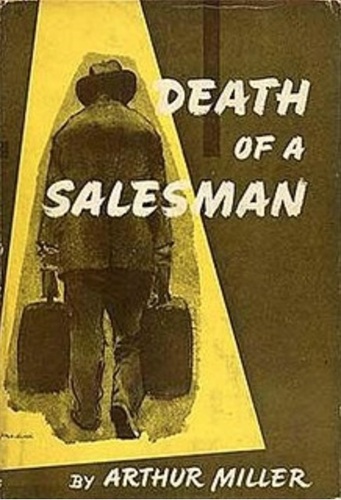
–>
August 26, 2022
NY Governor Kathy Hochul last week signed into law legislation that replaces the term “salesman” with “salesperson.” The bill was sponsored by (surprise!) two Democrats, and its intent is to remove “gendered,” “antiquated” language, to promote “inclusivity” and “diversity,” and to “recognize the contributions of women and non-binary persons.” The bill also mandates “him” and “her” being replaced by “their” in statutes that relate to the real estate industry.
‘); googletag.cmd.push(function () { googletag.display(‘div-gpt-ad-1609268089992-0’); }); }
Well, speaking as person who for years made his living as a salesman, and for even longer as a Boardwalk Pitchman — which is a subset of salesmanship, in the way that being a marksman is a subset of being a rifleman (and I can only hope that neither of those terms will be legislated into taking the “-person” suffix!) — and as a writer with a keen sense of semantics, I’m here to tell you that there is a clear semantic distinction between “salesman” and “salesperson,” and the latter is in no way a replacement for the former.
It’s a matter of replacing the right word with an almost right word, allegedly for the sake of not offending someone’s delicate feelings. It really serves no one, and serves the English language (which is capable, perhaps more than any other, of expressing precise concepts) least of all.
Mark Twain touched on the value of precise language when, alluding to a similar remark made by his fellow humorist Henry Wheeler Shaw (who wrote as “Josh Billings”), he said, “The difference between the almost right word and the right word is really a large matter –’tis the difference between the lightning-bug and the lightning.”
‘); googletag.cmd.push(function () { googletag.display(‘div-gpt-ad-1609270365559-0’); }); }
It makes perfect sense, for example, to replace “fireman” with “firefighter” because, in the proper context, “firefighter” is a more precise description of what the job entails; “fireman” remains the right word for someone who stokes a furnace.
 But Arthur Miller didn’t write “Death of a Salesperson.” And the real estate agents depicted in David Mamet’s Pulitzer Prize-winning Glengarry, Glen Ross (although they were hardly role models for the profession) weren’t salespersons, either; they were salesmen.
But Arthur Miller didn’t write “Death of a Salesperson.” And the real estate agents depicted in David Mamet’s Pulitzer Prize-winning Glengarry, Glen Ross (although they were hardly role models for the profession) weren’t salespersons, either; they were salesmen.
Just because a word ends in “-man” doesn’t necessarily make it gender-specific. The “-man” suffix is just a convention of language that has served us well for centuries. We speak of “man” or “mankind” (as in “One giant leap for mankind”) and no sane person thinks those terms are limited to describing only those with XY chromosomes (even though, according to current language revisionists, the very terms “man” and “woman” and even “male” and “female” are no longer clearly defined by whether one has XY or XX chromosomes). I submit that “salesman” is not a “sexist” term.
I’ve known plenty of women who were salesmen, and they were proud to identify themselves thusly, and it never compromised their femaleness nor their femininity. And saleswoman is semantically more akin to salesperson than to salesman; no one studies or writes books about the art and science and psychology of Saleswomanship.
A salesperson is essentially a clerk, an order-taker. With all due respect to folks who are employed in such manner, any zhlub working behind a retail counter or holding a clipboard and an order form can be called a salesperson. A salesman, on the other hand, employs a skillset that frequently involves prospecting and qualifying and, most importantly, closing, which involves the techniques of overcoming objections.
But perhaps even more important is that the salesman, rather than just “winging it,” controls the interaction and makes sure that every word and gesture is deliberate, and calculated to move the interaction in the direction of the sale. We could say that the difference between a salesperson and a salesman is the difference between being reactive and being proactive.
‘); googletag.cmd.push(function () { googletag.display(‘div-gpt-ad-1609268078422-0’); }); } if (publir_show_ads) { document.write(“
In a retail interaction, for example, a salesperson thinks that “May I help you?” is the perfectly acceptable, even de rigueur way to begin the interaction; a salesman would never be caught uttering that phrase, for a number of reasons. It sets the wrong tone; it invites a negative response, thereby violating one of the Basic Principles of Sales — “Don’t ask a question that can be answered with a No” (just as a trial lawyer never asks a witness a question to which the lawyer doesn’t already know the answer). It also violates the basic principle of “Assume the Sale.”
My old friend “Smiley,” who operated a hot dog cart on a streetcorner in Portland, OR, was a salesman who perfectly understood the principle of “Assume the Sale.” When people approached his cart, or even looked in his direction, he didn’t ask, “Would you like a hot dog?” He asked, “How many, please?” In every Western movie or TV show we’ve ever seen, when a cowboy ties his horse to the hitchin’ post in front of the saloon and strides through the swinging doors and up to the bar, the bartender doesn’t say “May I help you?”; he says, “What’ll it be, Cowboy?”
When the prospect asks a question like “Does it come in blue?”, the salesperson (who may take great pride in knowing his or her product backwards, forwards and inside-out, and be delighted to supply a positive answer, and may even know to not be merely positive when you can be emphatic) may eagerly respond “Absolutely!”, but that still does nothing to advance the interaction toward the sale. The salesman, however, responds to the same question with “Would you like a blue one?” And when the prospect answers “Yes,” the sale has essentially been made!
Salesmen (be they men or women) know this stuff; salespersons don’t have a clue.
It should be obvious that I’m fascinated by the art and psychology of sales, and have lots of advice to offer on the topic. My advice to the woke, virtue-signaling revisionists of our language, however, is pretty simple: Don’t go dictating changes in matters you know nothing about.
Autobiographical Note: Besides having sold encyclopedias door-to-door, I have sold tuxedos, hot tubs, burglar alarms and motorhomes. I’ve sold T-shirts out of a van parked at abandoned gas stations, and peddled Authentic Hippie Spoon-Rings at biker bars and festivals, and volcanic ash masks during the eruptions of Mt. St. Helens. But for more than 30 years I was a Boardwalk Pitchman, earning that title by serving my apprenticeship on the actual Boardwalk of Atlantic City (where the motto is “Ocean, Emotion and Constant Promotion”) and then going on to work fairs, shows and expos all over the country, pitching items like “The Amazing Ginsu Knife” and the product now known as the “Sham-Wow.” A memoir of my time on the Boardwalk can be found here. I love sharing what I’ve learned: I’m still threatening to write my book, “How to Work the Booth” (Publishers, please note), and my short lecture on “3 Things to Never Say at the End of a Sale (and Why)” is available for sales meetings.
Cover: fair use
<!– if(page_width_onload <= 479) { document.write("
“); googletag.cmd.push(function() { googletag.display(‘div-gpt-ad-1345489840937-4’); }); } –> If you experience technical problems, please write to [email protected]
FOLLOW US ON
<!–
–>
<!– _qoptions={ qacct:”p-9bKF-NgTuSFM6″ }; ![]() –> <!—-> <!– var addthis_share = { email_template: “new_template” } –>
–> <!—-> <!– var addthis_share = { email_template: “new_template” } –>







